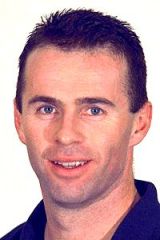'They are adults, not schoolchildren'
Jock Campbell, Australia's conditioning coach, explains the secrets of his success
|
|

|
I didn't!
There are no real bans on tour. These are grown men, mature men with much at stake, playing under high pressure, and they got there because of their talent and work ethic. This is the players' livelihood, so they are definitely not going to do things that will detract from performance. I must stress: they are adults, not schoolchildren - there are no bans on players.
So often people are looking for that magical secret, that one thing that makes athletes what they are and how they become that way. It's a question I get asked a lot. The secret is not a secret at all, it is simple. It's a supplement that I prescribe a lot called HBW - ie hard bloody work! Players must be consistent hard workers during the season and in the off-season to improve their physical weaknesses and enhance and maintain their strengths.
That's probably not my area, as I'm the physical trainer, not the mental one, however, I'll have a crack at it! It's quite difficult as the schedules are so crammed these days. There is very little spare time for the players, with them lucky to get one full day off per month, so when they do get a chance most players try to get right away from cricket and have a mental break. Matt Hayden loves his surfing and fishing, any chance on tour we get, both he and I go surfing, Symonds reckons he's a good fisherman (I've seen no evidence of this), Michael Clarke goes for a ride on his Ducati, Brett Lee plays his guitar and writes songs, McGrath goes shooting or takes his helicopter for a spin, and then there are the boring ones that just do the old cliché and play golf, or some even just play with their hair care products! The key is with such minimal time to see some of the fantastic locations we go to, is to get amongst it any chance you get and the boys use their spare time very effectively.
All the players are conscious of the large workload, and that's a big part of the reason they are so well conditioned. The older players are very hard workers and conscious of taking care of their bodies both on and off the playing area. That's the reason why in their thirties they are peaking rather than falling away. Fine examples of this are Langer, Hayden, McGrath, Gilchrist, Martyn and Warne, all playing as well as ever. Age is not the limiting factor, it is desire and condition. Remember, Linford Christie won the 100m sprint at the Olympics at the age of 36.
His secret is that he works extremely hard both physically and on his skills, and prides himself on his mental toughness. Whatever Matt does, he does long. When he goes surfing he'll go for three hours, when he trains he'll ride the bike for a couple of hours: nothing is done in half-measures. He trains hard and leaves nothing to chance; he is always very well prepared.
A lot has been said and made of these sand hill sessions, but they were just one session of the players' eight-to-ten physical sessions a week. The sand hills are an extremely tough session, and were used for a number of reasons. Initially they were used as a hard aerobic session where the intensity of training was increased without the jarring effect on the players' knees ankles and backs that you get from training on hard surfaces. This was done in long-interval format so the players could work at, or above, their anaerobic threshold several times which helps increase their ability to perform at higher sub-maximal aerobic workload. The sand hill sessions were also used to help develop specific leg strength and explosive power with both assisted (slight downhill) and resisted (up hill) work. They were the hardest sessions of the week, long and mentally tough to get through. In one session we were even joined by a two-time current Olympic 800m runner, who Michael Clarke fared extremely well against!
Everyone at some stage complains about training ... except fitness trainers, or future fitness trainers! Our team is full of exceptionally committed athletes who train very hard all year round, but even the great Aussies, on rare occasions, complain about training. As a fitness trainer you are not doing your job properly if your athletes don't complain, they must train hard to improve, and yes go through some pain to reach their peak, and this is where a little bit of complaining comes in.
Nagraj Gollapudi is sub-editor of Wisden Asia Cricket